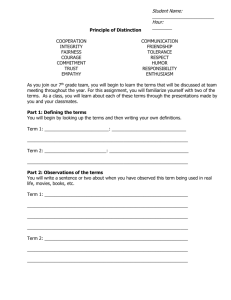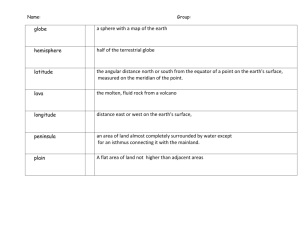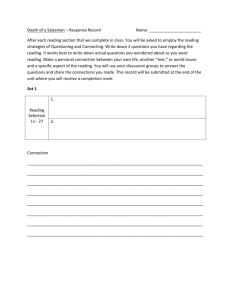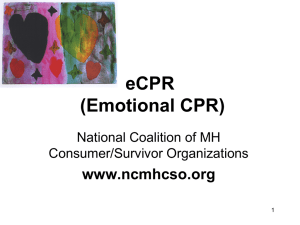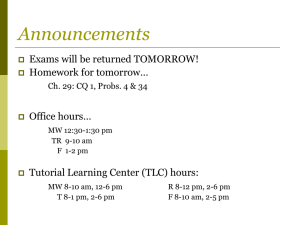Collaboration and Co-authorship Jenny Delasalle (theory) & David Wright (practice)
advertisement
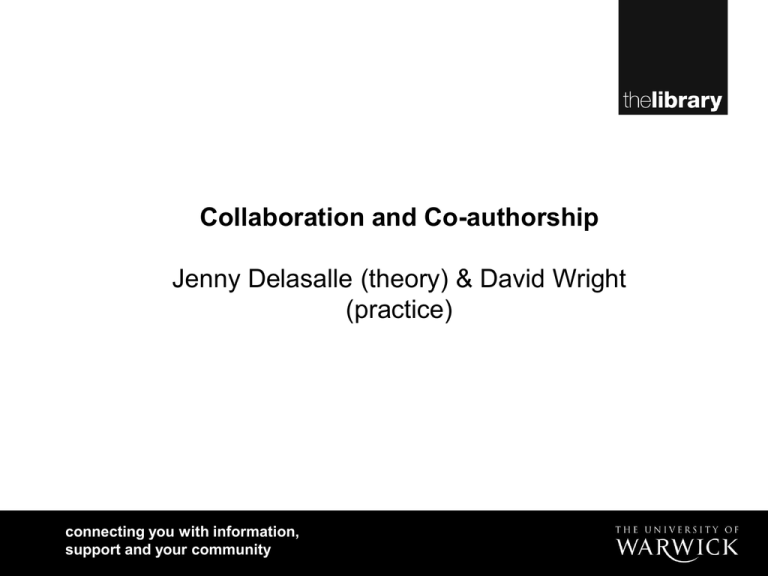
Collaboration and Co-authorship Jenny Delasalle (theory) & David Wright (practice) connecting you with information, support and your community What do we mean “Collaboration”? • • • • Interdisciplinary? International / National / Institutional Between individuals, groups, institutions, sectors, etc… All research is collaborative? • Collaboration can lead to co-authorship • Not all co-authorship is collaboration: collaboration is between equals? • We will focus on collaboration as an individual, ECR connecting you with information, support and your community Why try collaboration? 1. Cost benefit of pooling resources/equipment & training 2. It’s easy to do: 1. Travel is relatively easy & cheap 2. Communication tools are advancing: easier & faster 3. Need for specialisation in science: “experimentalists tend to collaborate more than theoreticians” 4. Political/external drivers - eg creating a joined-up Europe • Helps to achieve “impact” - Crossing disciplines & sectors, eg academic & industry or government connecting you with information, support and your community Considering collaboration Benefits Costs Pooling resources, knowledge, skills, techniques, eg a writing partnership could play to different skills. Time to find common language and build relationships. Need admin procedures? Gaining knowledge, etc Is it equal? New insights: inspiration Differences of opinion inevitable! Overcome intellectual isolation Cost of travel Access a wider network of contacts Demands of keeping others informed connecting you with information, support and your community US authorship trends Science field Astronomy Medical sciences Biological sciences Physics Average for all 'science' fields Chemistry Agricultural sciences Geosciences Engineering Other life sciences Psychology Computer sciences Mathematics Social sciences Average no. of authors per journal article in 2008 5.9 5.6 5.3 5.3 Percentage change 1988 to 2008 136 56 61 61 4.7 52 4.3 4.3 4.0 3.8 3.2 3.2 3.0 2.0 1.9 39 59 67 52 60 60 58 33 36 connecting you with information, support and your community From the LSE Handbook “Impact of Social Sciences”. Average number of co-authors by discipline across five social science disciplines in the Impacts Project Database Senior Subject Lecturer Professor Lecturer Geography 1.9 1.5 2.4 Economics 1.3 1.6 1.6 Sociology 0.8 1.1 1.6 Political Science 0.5 1.0 0.9 Law 0.3 0.6 0.6 Overall Average 1.0 1.2 1.4 connecting you with information, support and your community The Finch report, 2012 • “The rise in the no. of articles published by UK authors has not been as fast as in the very high-growth countries such as India and Brazil…” • “UK researchers are also more likely than those in almost any other major research nation to collaborate with colleagues overseas: almost half (46%) of the articles published by UK authors in 2010 included a non-UK author.” connecting you with information, support and your community Co-authorship: Advantages • Authors’ experience & contacts with editors & reviewers are shared. • Writing strengths/weaknesses are evened out. • Additional discipline/motivation to not let others down. • “Internal refereeing”: quality higher. • Speed: Round the clock working as colleagues in the US or Australia work whilst you sleep! • Higher number of citations! • International interest? connecting you with information, support and your community Collaboration and co-authorship practice • • • • • • • – Practices vary: peer review in the Arts can take upwards of 6 months. Building a research partnership or a publication strategy?! Agreement on what to publish & where Agreement on percentage contributions/word counts and deadlines: balance of skills and knowledge. Allow time! How are you going to respond to peer review comments? Acknowledging contributions: variety of practice Negotiation skills! • Co-authorship and the REF connecting you with information, support and your community Vancouver protocols for co-authorship Authorship credit should be based on all of these: (1) substantial contributions to conception and design, acquisition of data, or analysis of and interpretation of data; (2) drafting the article or revising it critically for important intellectual content; (3) final approval of the version to be published. connecting you with information, support and your community Finding a co-author • Might begin with finding a collaborator, or: • Are your findings significant enough for a whole paper? – Is there someone whose work relates to yours, where you have both researched separately but could write up your findings together? • Where to look: – Institutional repositories like WRAP – Profile pages on department websites – Tools like Research Match – Attend events & talk to people! • How are you going to respond to invitations from others? connecting you with information, support and your community Vitae Tips on authorship http://www.vitae.ac.uk/CMS/files/upload/P GR_Tips_authorship_72.pdf • Discuss authorship from the beginning of any project • Be prepared for things to change: more people may be involved & therefore named. • Who will be first author? Joint first authorship? Corresponding author? Last named author as head of research group? • Be realistic about your contribution • Keep in touch after you have moved on • Consider acknowledgements connecting you with information, support and your community Further reading, from the LSE… Versions toolkit: http://www2.lse.ac.uk/library/versions/VERSIONS_Toolkit_v1_final.pdf … contains advice on journal article version names. LSE guide to impact in soc sciences http://blogs.lse.ac.uk/impactofsocialsciences/the-handbook/ …includes evidence that co-authorship leads to higher no.s of citations, in Chapter 4 and advice on external partnerships, in Chapter 5 connecting you with information, support and your community Copyright & Author agreements: Useful links • JISC Model “Licence to Publish” (if http://copyrighttoolbox.surf.nl/copyrighttoolbox/autho rs/licence/ • Creative Commons (if publishing online yourself )http://creativecommons.org/licenses/ • Publisher Agreements on SherpaRomeo http://www.sherpa.ac.uk/romeo/ • Indemnity clauses: nothing the author has written is libellous / infringes IPR / is contempt of court. • The law is NOT Yes/no, black/white!!! connecting you with information, support and your community
